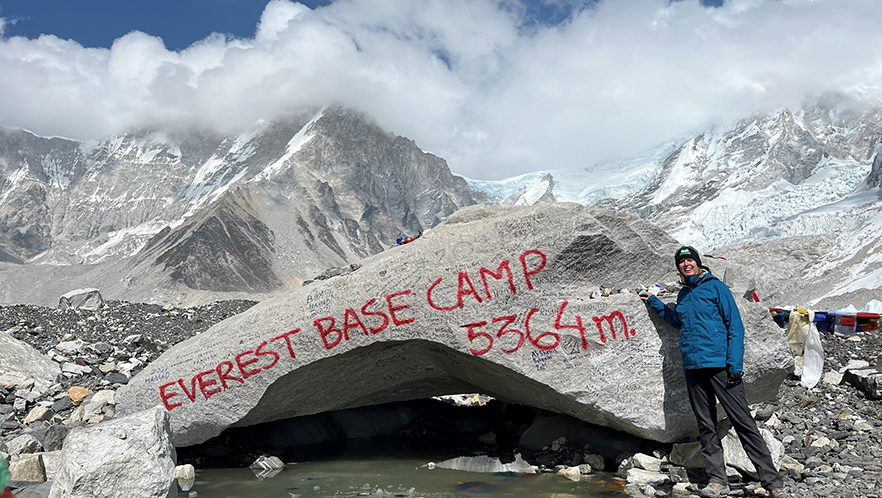
After reaching 18,000 feet surrounded by the tallest peaks in the Himalayas, Jill Pearson returned home in late March from a three-week trek to the base camp of Mount Everest with spirits just as high.
Jill, a program manager in ethics and compliance, made the journey to raise money and awareness for Duchenne Muscular Dystrophy (DMD), a rare genetic disease that primarily affects boys. About one out of 5,000 boys is diagnosed with DMD, and it is the most severe of all muscular dystrophies.
“Because it’s a rare disease, it can be tough to get funding and research for the cause,” Jill said. “That’s all the more reason to do something big.”
She trained for months, going on long walks to prepare for the eight-hour days of hiking. She also prepped her colleagues for her absence and worked with her leaders and HR partners to coordinate her time off through a leave of absence and PTO.
“I really found a supportive network among my team and partners,” she said. “Everyone was asking about the trek and eager to help out.”
The ascent
Jill first heard of DMD about 12 years ago, when she saw social media posts from her longtime friend, Tonya. Tonya’s son, Gus, was diagnosed with DMD, and Tonya decided to form the Hope for Gus Foundation. After years of local fundraising efforts, Tonya began to organize treks to Everest Base Camp to raise money for research and better treatments for the disease.
This year, Jill was finally able to join the journey.
Before she and the group even began their expedition, Jill spent more than 30 hours traveling to Kathmandu, Nepal. From there, the team flew to Lukla and began their trek to Everest Base Camp.
The group’s journey was filled with long days of hiking and interacting with locals. They would stop along the way at “tea houses,” modest accommodations providing meals and a place to rest for the night. Jill said the local people were supportive of their cause and many of them recognized Tonya from past treks.
When the group reached the base camp, they unfurled the DMD flag and read the 800 names listed on the flag of individuals suffering from, or who have died of, DMD.
“It was so meaningful hearing their names read out loud,” Jill said. “It felt very symbolic. We made it through our hike in hopes that one day there’ll be a cure and Duchenne won’t affect these boys or anyone else.”
In total, the group was able to raise about $60,000. Jill has raised over $6,000 of that herself.
Jill said she’s honored to have participated in the trek. “I’m grateful to get the word out about Duchenne and to share this experience with others who were following our journey,” she said.
